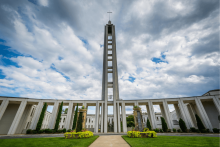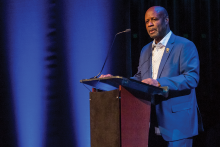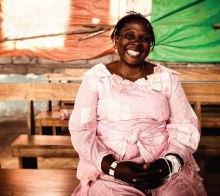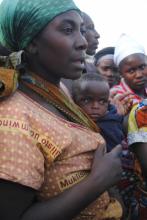Displacement

I’ve spent the past six years studying churches and urban renewal, a mid-20th century movement in the U.S. intended, according to President Harry S. Truman, to provide “a decent home and a suitable living environment for every American family,” but which many activists now see as the foundation of our contemporary housing crisis. As part of my research, I’ve studied how Christians — especially white Christians — participated in the remaking of American cities. It’s not a history we often tell, but buildings like First Baptist are hiding in plain sight, monuments to a time when white churches allied themselves with forces that displaced communities of color and redistributed their lands.

IN JULY, Lee Bennett Jr. stood at the podium of the Gaillard Center in downtown Charleston, S.C., as part of a three-day bicentenary commemoration of Denmark Vesey — a free Black man who had planned what could have been the largest organized resistance by enslaved people in U.S. history. Bennett brought both American history and personal history with him that day: The space where he spoke used to be his own neighborhood. There are some places where the veil between past and present feels especially thin.
The next day, Bennett offered me a tour of Mother Emanuel AME Church, where he is the historian. He spoke about Vesey, a founding member of Hampstead AME Church, established in 1818. In 1822, Vesey was arrested and executed, along with 34 others, for his plan to liberate the enslaved people of Charleston. Later that same year, a white mob destroyed Hampstead Church. By 1834, the city of Charleston made it illegal for Black congregations to meet, pushing the congregation to gather in secret until after the Civil War. In 1865, they came out of hiding and took the name Emanuel, “God with us.”

A FEW YEARS ago in this column, I told the story of Charlene, a woman I had just met in a camp for displaced people in the Democratic Republic of Congo. Charlene’s civilian husband had been murdered by rebel fighters in Congo’s brutal civil war. She and her eight children then fled for their lives, ultimately finding shelter in the hovel of mud and sticks where I met them (September-October 2010).
Like thousands of other displaced Congolese women, Charlene had been forced by destitution to hike into the forest for firewood to trade for food for her children. Like thousands of other displaced Congolese women, Charlene had been brutalized by fighters who hid in the forests and used rape as a weapon of war. Like thousands of other displaced Congolese women, Charlene had been impregnated by her rapist. Because of the stigma of rape in that culture, the beautiful two-week-old baby she’d named David was destined to a life of marginalization and despair.
Charlene was the first woman I met in Congo. She explained to me that even when the women went to the forest in groups, armed rebels would overpower and rape them. If husbands went into the forest to protect their wives, the rebels would kill the husbands, and then rape the wives. The women took the risk—and paid the price.
For me, Charlene gave human shape to Congo’s horrific story of colonial exploitation, tribal conflict, and foreign greed. In the four years after we met, hers was the first story I told whenever I spoke about Congo. It was her pain that motivated me to keep speaking, writing, and advocating for Congo.

OUR PLANE SITS at the gate in Brussels well past our departure time. Slowly, the empty seats fill with Somali refugees whose flight a day earlier had been cancelled. After a night in the airport, they slide wearily into scattered seats.
Ten years together in a refugee camp in Uganda has melded the group into a close-knit family. What do they feel now, I wonder, knowing that on the other end of this flight they will scatter, not to empty seats but to unknown cities throughout the U.S.? From Syracuse to San Francisco, they will look upon a world they have never imagined. “When will I see my friend?” one little girl asks, not realizing she and her friend will live half a continent apart.
I watch a man a few rows ahead of me. I learn from his friend that he suffers from headaches. I know enough about refugees to realize headaches will likely be the least of his challenges. He and his family will face a confusing culture, strange language, unfamiliar religious practices, unknown yet required skills, and new technology—from flush toilets to garage door openers, from light switches to iPads. Then they’ll have to sort out schools and jobs and health care. They’ll be starting over, basically, with nothing.
Almost nothing. One suitcase per person contains the bit of their past they carry into their future. These slim and elegant humans are traveling very light. Unless, of course, you count the weighty baggage of war and displacement.
